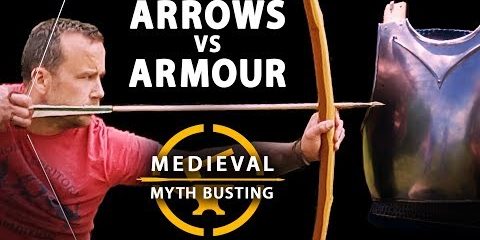What happens when a 160lbs ENGLISH LONGBOW shoots FULL WEIGHT MEDIEVAL ARROWS at properly Reproduced MEDIEVAL ARMOUR?
The English longbow is laden with myth; of its origins, its power, its achievements. The centuries that have passed since it was used in earnest, means that the knowledge of what the bow was actually capable of doing, has also passed. The captains and commanders that once knew its’ true power in physical and in military terms, are long dead. The knowledge is lost and it is time to rediscover what it can and cannot do.
The contributors are all world class in their fields of expertise, armour, arrows, shooting and historical context.
Joe Gibbs – Archer and bowyer
Will Sherman – Fletcher – http://www.medievalarrows.co.uk
Kevin Legg – Armourer – http://www.plessisarmouries.co.uk
Chrissi Carnie – Fabric armour – http://www.thesempster.co.uk
Dr Tobias Capwell – Arms and Armour Curator, The Wallace Collection
Tod Todeschini – Host – http://www.todsworkshop.com
http://www.todcutler.com
Find out more about the battle, the armour and the arrows in these companion films.
The battle https://youtu.be/A0OXRzk5K14
The armour https://youtu.be/934fmJXrYOM
The arrows https://youtu.be/1Jac4EQsBNs
Longbow
160lbs (73Kg) mountain yew English Longbow based on those found on The Mary Rose (sank 1545). Bow was shooting 80g (2.8oz) arrows at 55ms (180fps) at 10m, giving 123J and 52ms (170fps) 109J at 25m
Distance 10m 25m
11yds 27yds
Speed 55ms 52ms
181fps 170fps
Energy 123J 109J
91ftlbs 80ftlbs
Arrows
The first arrow type we used was MR80A764/158. The diameter at the shoulder was 12.7mm (1/2”) tapering to a nock of 8.5mm. Total length was 30.5”
The second arrow type was MR82A1892/9. The diameter at the shoulder was 12.9mm (1/2”) and the nock was 7.5mm. Same total length.
The shafts were black poplar (Populus Nigra) and ash (Fraxinus Excelsior).
Fletchings were swan, bound with silk into a beeswax, kidney fat and copper verdigris compound.
Heads were wrought iron, copied from MoL Type 9 7568
Arrows weighed 80g (2.8oz)
Breastplate
Based on the Churburg 14 piece. The reproduction is made from 0.5% carbon steel and air cooled and is of variable thickness. The front and centre is 2.5mm (3/32”) thick and it tapers down to 1.5mm (1/16”) at the sides and edges.
Resources
Mary Rose Trust
https://maryrose.org
The Wallace Collection
https://www.wallacecollection.org
Museum of London
https://www.museumoflondon.org.uk/museum-london
Azincourt Museum (Agincourt)
https://www.tripadvisor.co.uk/Attraction_Review-g804483-d797237-Reviews-Centre_Historique_Medieval_Azincourt-Azincourt_Pas_de_Calais_Hauts_de_France.html
Churburg Armoury
Alan Williams – The Knight and the Blast Furnace
https://www.amazon.co.uk/Knight-Blast-Furnace-History-Metallurgy/dp/9004124985
Dr Tobias Capwell, Armour of the English Knight
https://www.amazon.co.uk/Armour-English-Knight-1400-1450-2015/dp/0993324606/ref=sr_1_2?keywords=capwell+tobias&qid=1565003503&s=books&sr=1-2
Jupon of Charles VI https://www.academia.edu/5610708/The_Tailoring_of_the_Pourpoint_of_King_Charles_VI_of_France_Revealed
“Grand Canyon” Music licenced from www.bensound.com
For opening my mind to all of this and fantastic general information
http://myarmoury.com/home.php






